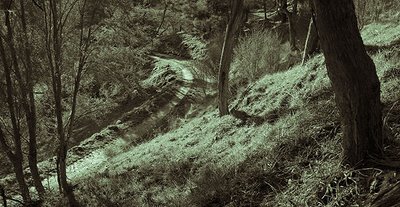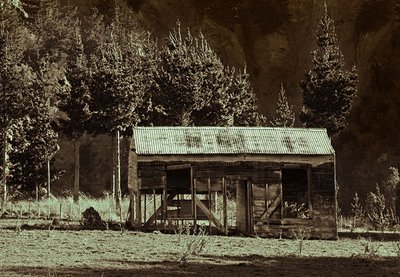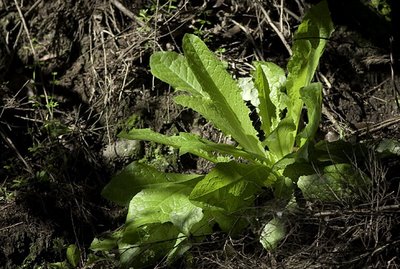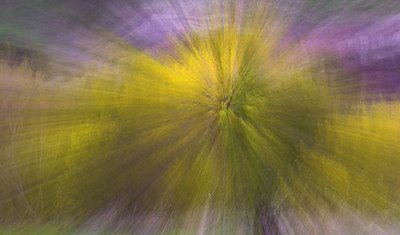A shower of rain, heavy on the roof at night. A friend sends a txt: the sound of rain, her bed a tent, her vehicle a bike, her house a backpack. I reply saying rain here too, but there's too much stuff here, and tell her about the herons nesting in the poplars by the bridge [1].

The Gang of Three visited this morning. We sat on the verandah and I read another book to them, but Emma, being only four, got distracted and kept checking the paddock for more pieces of wood for their fireplace. “That one's no good!” she said, “It's got dirt on it!” My reading meant nothing to Aaron, of course—he's less than a year old and only just discovering words. Carly, however, sat next to me listening, attentive, politely not interrupting. Holding onto Cookie. She tells me he likes going for walks because he gets bored lying in her room all day doing nothing until she's home from school. Eventually Olive and Aaron went to feed the deer and lambs, and the girls and I followed shortly after, to find Aaron sitting on the ground by the gate, in the mud, with two lambs checking him out while Olive threw stale buns or something to the deer in the next paddock. We rescued him as Olive returned, half muttering and half laughing about kids and mud and saying that’s what washing machines are for. Back on the verandah we sat on the steps, chatting while the kids ran up and down the verandah yelling and having fun. Aaron waddled over and managed to topple and slide head first onto the top step. Not serious, but I expected howls and tears. But Emma picked him up and put her arms around him—she’s hardly bigger than he is—and hugged him, tucked his head into her shoulder and held him tight. The tears never came—instead, he went straight back to stealing the pieces of wood she'd collected, and offering them to me.  I remembered how Emma had become upset a few weeks ago and Carly had comforted her in the same way; arms around her. The wisdom of small children. I think of the puerile behaviour of our politicians and realise they don't deserve the compliment of being called “childish”.
I remembered how Emma had become upset a few weeks ago and Carly had comforted her in the same way; arms around her. The wisdom of small children. I think of the puerile behaviour of our politicians and realise they don't deserve the compliment of being called “childish”.
I walked down the road, stopping to photograph tui [2] and korimako [3] and the herons standing tall and thin in the poplars by the bridge; walked on up No. 3 Line a little way, then returned, photographing the herons again and a kereru [4] in the cutting. Cold air but the brilliance of a clear day at the deep end of winter; some warmth. Birds; lambs growing day by day—already the wobbly fragility of the newborns has begun to disappear and they’re beginning to develop that slight robustness. I walked along the road and looked out over Te Awaoteatua Stream from the No. 3 Line road, looked up to the Ruahine, dense with leatherwood [5] and bright under dark cloud, and saw everything new, saw it all as if for the first time. The following evening I drove South to Point Howard. The light still had that old look to it—deep shadows, strong relief, the warm look where the sun caught the land seemingly at odds with the cold  contained in gullies, under hedges, beneath trees, behind barns. Shower cloud darkened the sky and let the sunlight through in rays and beams. Prehistoric light. Along the coast between Paekakariki and Pukerua Bay the sun had almost set, the clouds orange and mauve and grey; the South Island silhouetted on the horizon. That feeling of the utter remorselessness of time. You look ahead to something, then it’s here, then it’s gone. It becomes the past; becomes history. Your history. Is that all we do—moment by moment, create our own histories? In a sense, maybe it is, whether we create it—in the sense of determining or influencing it—or not. But, seen like that, perhaps it’s the ultimate lesson in making the most of every moment: because we’ll never get another chance. What we do with these moments determines what they’ll be, forever.
contained in gullies, under hedges, beneath trees, behind barns. Shower cloud darkened the sky and let the sunlight through in rays and beams. Prehistoric light. Along the coast between Paekakariki and Pukerua Bay the sun had almost set, the clouds orange and mauve and grey; the South Island silhouetted on the horizon. That feeling of the utter remorselessness of time. You look ahead to something, then it’s here, then it’s gone. It becomes the past; becomes history. Your history. Is that all we do—moment by moment, create our own histories? In a sense, maybe it is, whether we create it—in the sense of determining or influencing it—or not. But, seen like that, perhaps it’s the ultimate lesson in making the most of every moment: because we’ll never get another chance. What we do with these moments determines what they’ll be, forever.
My friend sends another text; words I recognise: “…geese in flight and dogs that bite…”[6]. I check the definition of “vagrant”[7], and read, “A wanderer who has no established residence or visible means of support.”
The wind picks up, and a shiver runs through the house.
Notes:
The names of some people may have been changed.
1. White faced herons; Ardea novaehollandiae novaehollandiae.
2. Prosthemadera novaeseelandiae.
3. Anthornis melanura.
4. New Zealand pigeon; Hemiphaga novaeseelandiae.
5. Olearia colensoi; tupare.
6. From James Taylor's, Carolina on my mind.
7. The definition is from WordWeb, the free edition. It may not be as comprehensive or authoritative as some other dictionaries, but for sheer functionality, it's peerless. Highly recommended.
Photos (click on the smaller photos if you want a larger image):
1. The kereru in the cutting.
2. Red billed gull (Larus novaehollandiae scopulinus; tarapunga) preening; Petone wharf, Wellington harbour.
3. The same gull, doing what gulls are wont to do.
4. Rock, mussels, waves. Eastern shore of Wellington harbour, near Burdan's Gate (ref. my 6 August post). I desaturated all the colours except the greens, and tweaked the contrast a little.









